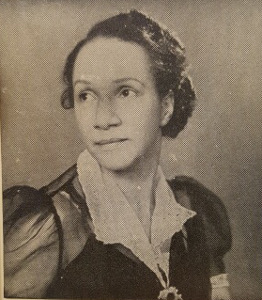Dr. George Washington Carver: Scientist
Shirley Graham, George Dewey Lipscomb

Author:
Shirley Graham ![]() , George Dewey Lipscomb
, George Dewey Lipscomb
Illustrator:
Elton C. Fax
Publication:
1944 by Julian Messner, Inc.
Genre:
Biography, Non-fiction, Science
Series:
Messner Shelf of Biographies (U.S. History)
Current state:
This book has been evaluated and information added. It has been read but content considerations may not be complete.
Book Guide
Search for this book used on:
When a poor southern plantation owner gave thieving night-riders his three-hundred-dollar horse in order to recover the sickly, orphaned Negro slave baby they had stolen from him, he must have felt he was making a bad bargain, though performing a good deed. But that weak, tiny baby grew well again, put himself through school and college, and then, almost miraculously, lifted the South out of its dependency on cotton, and out of the depression that had long accompanied worn-out fields and the scourge of the boll weevil. Agricultural and manufacturing establishments that today reckon their annual output in hundreds of millions of dollars grew out of the work of young George Washington Carver.
The southern peanut crop alone, under his guiding hand, jumped in value to millions of dollars yearly. He made roads out of cotton, insulating boards out of corn stalks, paper from wistaria, bright pigments, wallpaper inks and pottery out of the red clay. And he preached the virtues of a kitchen garden with its vitamin-giving greens until the dread disease of pellagra was eliminated from Macon County, Ga., and other regions.
"Start where you are, with what you have. Make something of it. Never be satisfied." That was ever George Washington Carver's creed. What he had was almost less than nothing—the weeds of the field, a worthless acre of clay soil, and bits of old wire and broken bottles for laboratory equipment. And in his makeshift laboratory he studied his poor soil, learned how to enrich it, and was able to teach Southern planters how to grow a five hundred pound bale of cotton to the acre. He advised farmers to grow sweet potatoes and peanuts when their soil would no longer support cotton—and then he studied those two products until he had evolved hundreds of new uses for them.
Henry Ford and Thomas Edison are only two of the many industrialist who offered Carver staggering salaries to leave his small laboratory at the Negro College of Tuskegee. But Carver knew that Tuskegee and the South needed him, and until his death, in his eighties, he remained there. His pockets were empty of money, but they were full—as they always had been—of the twigs, dried leaves, and bits of soil from which he created wealth and well-being for others. He had enriched the South with his work, and the whole world with his philosophy. When he was awarded the Theodore Roosevelt Medal in 1939 he was truly called a "a liberator to men of the white race as well as the black".
From the book
To view an example page please sign in.
To view awards and booklists please sign in.
Content Guide
Please sign in to access all of the topics associated with this book and view other books with the same topics.
Please sign in to access the locations this book takes place in and view other books in the same location.
Please sign in to access the time periods this book takes place in and view other books in the same time period.
For information about the lead characters please sign in.
Please sign in to access information about the content of this book that you may want to consider before reading.
Please sign in to read quotes from this book.
Find This Book
Search for this book used on:




